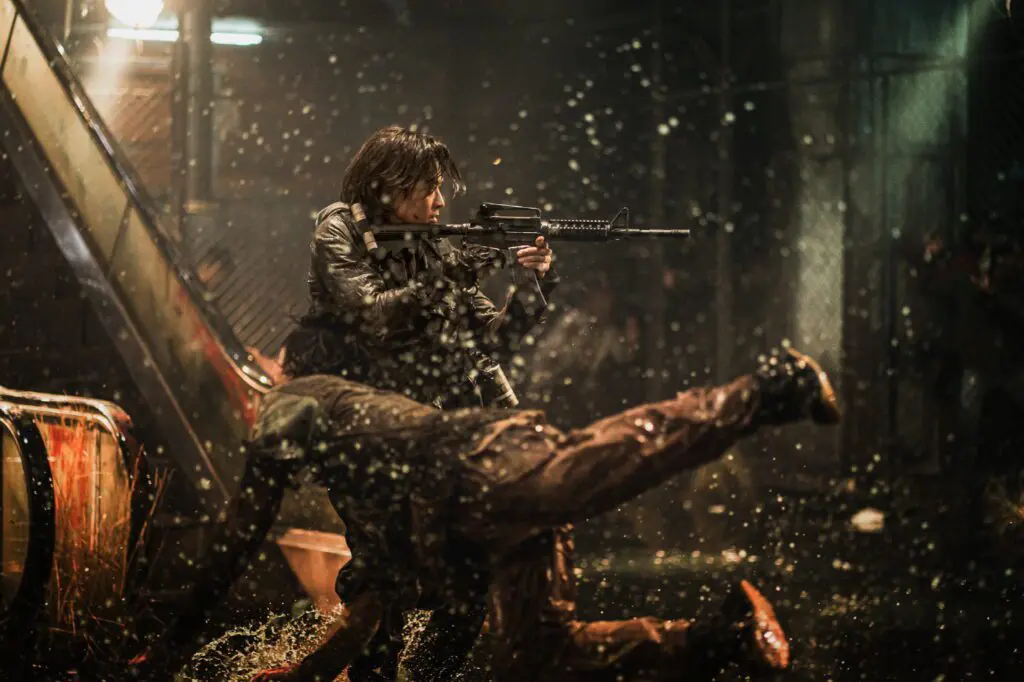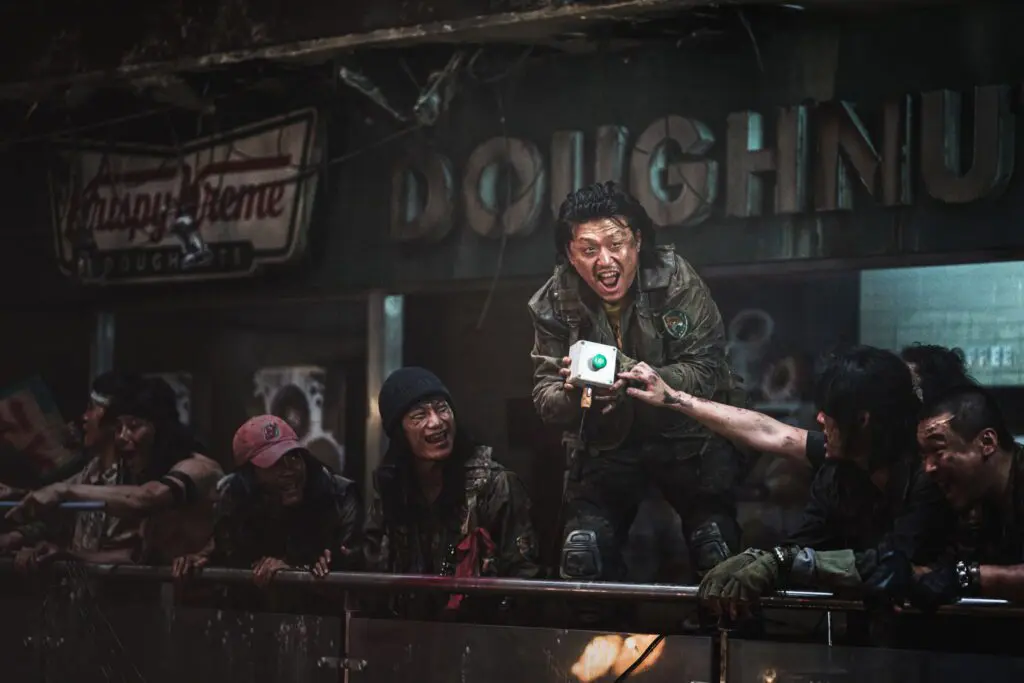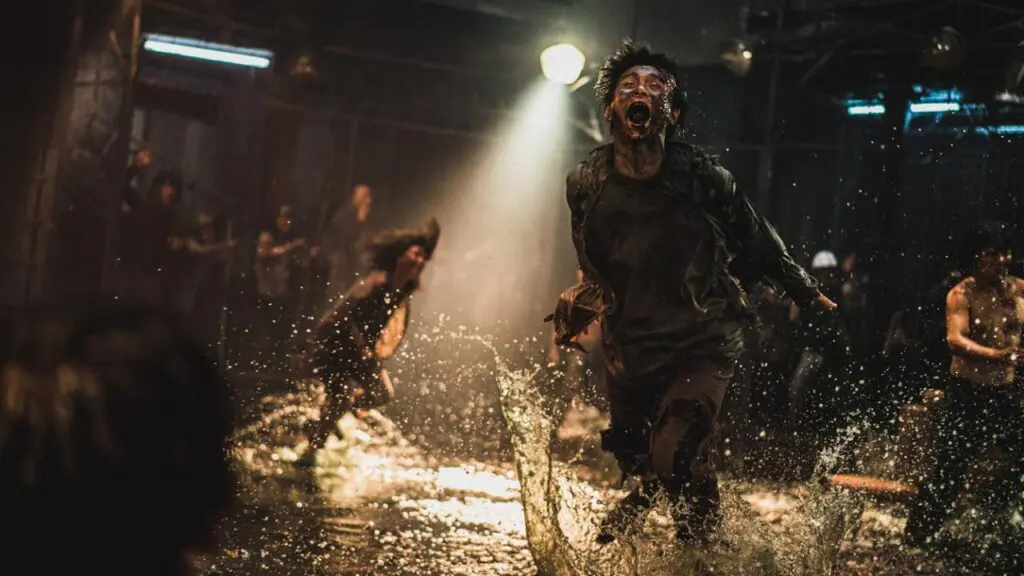Summary
Yeon Sang-ho’s follow up to the remarkable Train to Busan, set four years later, shows that bigger is not necessarily better. Overall, nothing wrong with it, if you rein in your expectations.
Peninsula (marketed in the USA as Train to Busan Presents: Peninsula) is a two-hour-long action romp through (one area of) South Korea which has been overrun by zombies since the virulent infection took hold suddenly four years earlier. It is also the follow-up to Train to Busan (the modern zombie film for people who don’t normally watch zombie films) and its companion animated film Seoul Station. There’s nothing wrong with Peninsula as such, but take firm hold of your expectations: this one is not a “zombie film” as such, and many fans of its predecessors may be disappointed.
After a brief prologue showing Jung-seok (Gang Dong-won) evacuating South Korea with his family, the majority of Peninsula takes place after the North and South Korea together have been effectively quarantined, cut off from the rest of the world. This might sound callous, and it is: the western powers had insufficient incentive (no oil, etc.) to find any way to help the doomed populous there. Hence, Korea has become run down with just a handful of survivors (some have likened the culture there to what we see in Mad Max), while the rest of the world flourishes, and we are given this exposition linking films to the earlier pair via a television news interview.

Jung-seok and his family form one of three groups of characters in a story about survival; sometimes that means taking advantage of other people and sometimes helping them. He and many other refugees have ended up in Hong Kong, but pretty much treated like lepers and living in ghettos. With his brother in law Cheol-min (Kim Do-yoon, the only face I think I’d seen before, in The Wailing) Jung-seok takes up a shady offer to return to his home country with the promise of a stolen fortune. There he meets Min-jung’s (Lee Jung-hyun) family, who had not been lucky enough to escape in one of the evacuation ships, and who allies with him in saving Cheol-min from the clutches of Unit 631, a nasty militia group who pit survivors against infected for entertainment.
So we have drama, action, character dynamics, a classic “what if” scenario, and a bunch of underdogs to root for. That’s all great and fun, but you’ll have noticed there’s been little mention of zombies so far. And although Peninsula is billed as “Action, Horror, Thriller”, there are no images containing zombies or similar in any of the publicity photos I was provided with for this review, so I guess the distributor feels the same. Sure, there are large quantities of “infected” in some parts of the film (doing that excellent flooding and scrambling that we first saw in Train to Busan), but we see hardly any of them up close and none for long: they are either a backdrop or a swarm.
Peninsula is distinctly about people, therefore; some of which are interesting, but unfortunately they’re all kind of two-dimensional, like superheroes with one defining ability or interest. Take Min-jung’s daughters, for example: Jooni (Lee Re) is a highly-skilled driver and Yu-jin (Lee Ye-won) uses remote-controlled cars to draw attention away from her loved ones. (Nice to see these traits owned by girls, I must say: without them, there would only have been three female faces in the whole film, two of whom were brief, to say the least.) Of course, there’s nothing inherently wrong with two-dimensional characters in a film, but Train to Busan gave us more warmth in the way everyone related; and simple though the characters may have been, they were all presented with some nuance and most with some development during the film. Not so much here.

Anyway, as well as a film about survival, with and against each other, Peninsula is also very much an action film, so perhaps the people can get away without much depth: the bad guys are bad, the survivors survive, and those who go back find themselves out of their depth. There’s nothing wrong with a cartoon level of writing quality: the action, when it kicks off, is fast, dramatic, and big scale. The car chases (and Lee Re’s driving acting) are especially memorable, and I’m not a car fan as a rule. The cinematography keeps up with the action beautifully: not once did I feel like I couldn’t tell who was where, or what was going on, as can sometimes happen in big-scale action scenes (the beginning of Avengers Infinity War being a prime example). So this is how to watch Peninsula: as a dramatic action movie, not a zombie horror.
If you go into Train to Busan Presents: Peninsula, apparently the last in Yeon’s zombie trilogy, ready to switch off with some mates and some popcorn for a couple of hours, you’ll have a great time. Knowing that the earlier two films were very different in both content and style, that shouldn’t be too much to ask. But go in expecting serious scares or zombie gore and you’ll be sorely disappointed. Have fun and manage your expectations.




